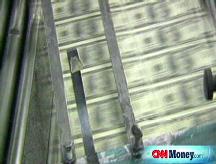What about my mortgage?
The government faces many complications in helping struggling homeowners get affordable loans.
NEW YORK (CNNMoney.com) -- The Bush administration wants to help beleaguered financial institutions - and prevent the financial crisis from getting worse - by spending $700 billion to buy up troubled mortgage securities.
But many struggling homeowners are asking: "Where's my bailout?"
Democratic lawmakers have taken up their battle and say they will include more help for homeowners as part of the proposal, according to Rep. Barney Frank, D-Mass, who heads the House Financial Services Committee. Final details are still being hammered out, but it appears that the idea is gaining traction.
Here's how the bailout could work: Once the Treasury Department takes hold of the securities, it can review the terms of the underlying loans and the financial shape of each homeowner. The department then could opt to modify the loans - by reducing the interest rate or principal balance - to affordable terms for borrowers.
The problem, experts said, is that the mortgages will be bundled into investments and sold. Therefore, the ownership of each loan is divided among all the investors who purchased the security.
And that complicates the process of helping individual homeowners.
"The No. 1 barrier to keeping people in their homes has been the challenge of these loans being in mortgage-backed securities," said Ken Wade, chief executive of NeighborWorks America, a national community revitalization group chartered by Congress whose board is made up of bank regulators. "Counselors across the board say that is the major hurdle they are facing."
Unless the government scoops up all the securities associated with a specific mortgage, they'll run into the same problems in trying to modify the loans as the banks did, experts said. Often it depends on the terms in the securities contracts.
"Mortgages of questionable value have been sold into highly-complex securities, which have been carved up and sold to thousands of investors around the world," said Kathleen Day, spokeswoman for the Center for Responsible Lending. "The government can't put these Humpty Dumpty slices back together again because it won't own or even control them all."
And unless all stakeholders agree to the change in terms, other investors could take the government to court over the modifications, said Chris Mayer, real estate professor at Columbia Business School.
Another complication is that some borrowers just can't afford to keep their homes. The government can't do much for them.
"They key question here is, we want to help homeowners that want to stay in their homes and have the financial capability to stay in their home," Treasury Secretary Henry Paulson said on Sunday. "And the vast majority of foreclosures in this country...are coming from people who either don't want to stay in their home, took out loans they couldn't afford as the result of irresponsible lending practices."
Many community activists, however, point to IndyMac Bank as an example of how government-led modifications could work.
When the Federal Deposit Insurance Corp. took over IndyMac in July, it quickly suspended foreclosure proceedings on any delinquent loans within the $15 billion portfolio owned by the failed institution. The next month, regulators announced the implementation of a systematic loan modification program available to about 25,000 borrowers.
The loans owned by IndyMac can be changed without too much trouble, experts said. But the agency itself acknowledged that some mortgages serviced by IndyMac are subject to additional terms, forcing regulators to take extra steps to comply with the contracts. The loan servicing portfolio totals about $185 billion.
"IndyMac is really the model," said Kurt Eggert, law professor at the Chapman University School of Law. "I would hope the government only buys loans where they can institute that model."
Bailing out the banks will only have a limited impact on boosting the economy, experts said. The key is to stabilize the housing market, which can only be done by stemming the onslaught of foreclosures, which hit a record 1.2 million filings in the second quarter.
The Center for Responsible Lending, along with more than 30 other community groups, is pushing for changes to the bankruptcy law that would allow judges to modify mortgages. Congressional Democrats support this measure, as well as a systematic approach to modifying troubled loans.
Once foreclosures subside, home values will stabilize and banks will be more likely to resume lending. This will lift up the economy, experts said.
"The focus should be more on relieving the stress on households rather than bailing out banks," said Christian Menegatti, lead analyst at economic research firm RGE Monitor. ![]()





